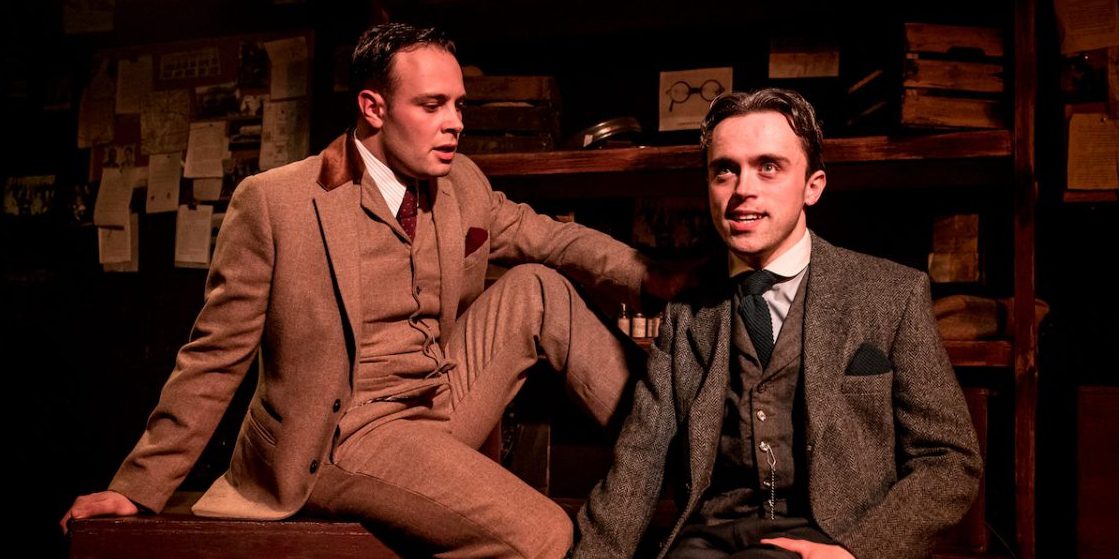This is the first production in the Jermyn Street’s ‘Outsiders’ season, and it is a cracking start. ‘Thrill Me’ is a tightly directed, award-winning show that was first seen at the Hope Theatre a couple of years ago. Fortunately, the two leads were available to reprise their performances and the eighty minutes zip past with the audience in completely focused concentration. The musical is both disturbing, funny and poignant, sometimes managing the alchemy of being all three at the same time.
The first point to make is that this theatre is an ideal setting. I last saw ‘Thrill Me’ in the cavernous spaces of the Arcola Theatre where it had much less impact despite quality playing. The claustrophobic intimacy of this 70-seater space takes you straight into the twisted, mutually exploitative relationship of two very young gay men in 1920s Chicago. This is very much a real-life story though the many retellings of it on screen, stage and page reflect how hard people have found it to believe and explain the events. Two privileged teenagers with careers as lawyers awaiting them start to perpetrate a series of burglaries, arson attacks and ultimately a gratuitous murder with ransom demand – and all for kicks, speciously justified with a gesture or two towards Nietzsche’s notion of the Superman. However, a carelessness, whether real or deliberate, provides clues that leads to their capture, a famous trial (not depicted here), and ultimately to incarceration for ‘life and ninety-nine years.’ The musical opens as Leopold, who outlives his partner, provides another re-telling – this musical – for the parole board that ultimately releases him.
What makes this all totally compelling first of all is the fluid pace of Matthew Parker’s direction. While the walls of Rachael Ryan’s period set are cluttered with paraphernalia associated with the case, the main playing area is continuously reworked into different scenarios with just a few stained packing cases that become a bed, chairs, desk or even the plush roadster where the murder is committed. Add to this the exquisite lighting scheme from Chris McDonnell and all the aesthetic requirements are met. The lighting changes can be fast and furious to depict the inferno created by arson in a warehouse or spot lit portraits that capture Loeb’s swaggering vanity in a doorway or Leopold’s restless insecurity. Sometimes you feel you are looking at sepia-toned photos in an old album that have miraculously come to life.
And what life it is. The dialogue is pacy, plausible and punchy; and while inevitably wordy because both the characters fancy themselves as self-preening intellectuals, each scene and the songs that punctuate them feels justified offering a natural evolution from words to music. The urgent, anxious, sometimes frenetic nature of much of the music can be a bit repetitive, especially in the churning piano accompaniments – this is not Sondheim – but it does work and feels right for these characters. Musical director, Benjamin McQuigg, has a lot to do at what sounds almost like a honky-tonk piano, and provides sterling support.
Both lead actors are at the top of their games – athletic, vulnerable, vocally confident and secure, and carefully holding back both energy, nuance and secrets until the release of the final scenes. It is right that both of them won Offies together because these performances are inseparable and viscerally feed off one another. Reitman starts off epically arrogant, cold, bored and fascinated by crime, whereas Lambert is nervous, calculating, and shy but also powerfully drawn to his friend with an evident sexual charge. Each seeks to seduce and manipulate the other, and the actorly wiles that are deployed to depict this gladiatorial battle are a technical delight to observe. There is dexterous verbal nuance and an evident physicality throughout. It is that crackle of bravura energy and invention that allows even the most cruel, depressing and sinister moments to have an edge of exhilaration about them as if the audience are participating in a guilty pleasure.
Even if you saw this show before at the Hope, you really should not miss the opportunity to experience this uncomfortable thrill again. You half expect to glimpse the ghost of Alfred Hitchcock sitting approvingly in the back row

